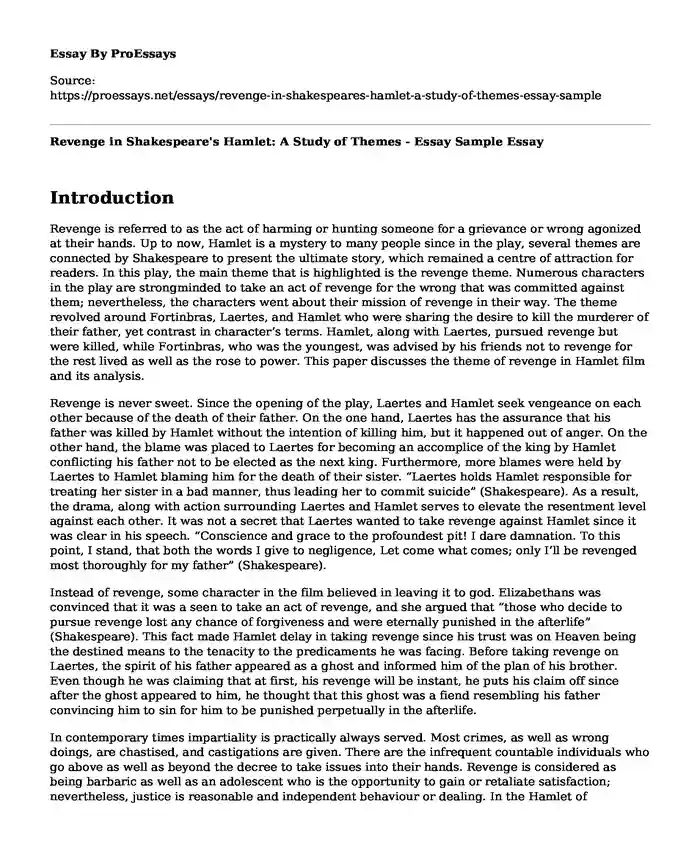Introduction
Revenge is referred to as the act of harming or hunting someone for a grievance or wrong agonized at their hands. Up to now, Hamlet is a mystery to many people since in the play, several themes are connected by Shakespeare to present the ultimate story, which remained a centre of attraction for readers. In this play, the main theme that is highlighted is the revenge theme. Numerous characters in the play are strongminded to take an act of revenge for the wrong that was committed against them; nevertheless, the characters went about their mission of revenge in their way. The theme revolved around Fortinbras, Laertes, and Hamlet who were sharing the desire to kill the murderer of their father, yet contrast in character’s terms. Hamlet, along with Laertes, pursued revenge but were killed, while Fortinbras, who was the youngest, was advised by his friends not to revenge for the rest lived as well as the rose to power. This paper discusses the theme of revenge in Hamlet film and its analysis.
Revenge is never sweet. Since the opening of the play, Laertes and Hamlet seek vengeance on each other because of the death of their father. On the one hand, Laertes has the assurance that his father was killed by Hamlet without the intention of killing him, but it happened out of anger. On the other hand, the blame was placed to Laertes for becoming an accomplice of the king by Hamlet conflicting his father not to be elected as the next king. Furthermore, more blames were held by Laertes to Hamlet blaming him for the death of their sister. “Laertes holds Hamlet responsible for treating her sister in a bad manner, thus leading her to commit suicide” (Shakespeare). As a result, the drama, along with action surrounding Laertes and Hamlet serves to elevate the resentment level against each other. It was not a secret that Laertes wanted to take revenge against Hamlet since it was clear in his speech. “Conscience and grace to the profoundest pit! I dare damnation. To this point, I stand, that both the words I give to negligence, Let come what comes; only I’ll be revenged most thoroughly for my father” (Shakespeare).
Instead of revenge, some character in the film believed in leaving it to god. Elizabethans was convinced that it was a seen to take an act of revenge, and she argued that “those who decide to pursue revenge lost any chance of forgiveness and were eternally punished in the afterlife” (Shakespeare). This fact made Hamlet delay in taking revenge since his trust was on Heaven being the destined means to the tenacity to the predicaments he was facing. Before taking revenge on Laertes, the spirit of his father appeared as a ghost and informed him of the plan of his brother. Even though he was claiming that at first, his revenge will be instant, he puts his claim off since after the ghost appeared to him, he thought that this ghost was a fiend resembling his father convincing him to sin for him to be punished perpetually in the afterlife.
In contemporary times impartiality is practically always served. Most crimes, as well as wrong doings, are chastised, and castigations are given. There are the infrequent countable individuals who go above as well as beyond the decree to take issues into their hands. Revenge is considered as being barbaric as well as an adolescent who is the opportunity to gain or retaliate satisfaction; nevertheless, justice is reasonable and independent behaviour or dealing. In the Hamlet of Shakespeare, the three characters experienced a sudden demise of one of the family members. The way they dealt with their issues showed the rage as well as confusion existing in the play.
Conclusion
In conclusion, revenge exposed several people in danger. Those who decide to take revenge in most cases are exposed to some dangers since they may never know what will happen at the end of the revenge. Some may even lose their life as a result while it may also involve some people who were not involved in the wrong act. Some times revenge may seem as sweet, but it always has the consequences at the end since the involved individual hat to take part and sacrifice for the act.
Work Cited
Shakespeare, William. "The Theme Of Revenge In "Hamlet" By William Shakespeare - Free Essay Example | Studydriver.Com". Studydriver.Com, 2019, https://studydriver.com/the-theme-of-revenge-in-hamlet-by-william-shakespeare/. Accessed 11 June 2020.
Cite this page
Revenge in Shakespeare's Hamlet: A Study of Themes - Essay Sample. (2023, Aug 28). Retrieved from https://proessays.net/essays/revenge-in-shakespeares-hamlet-a-study-of-themes-essay-sample
If you are the original author of this essay and no longer wish to have it published on the ProEssays website, please click below to request its removal:
- "A Worn Path" Analysis Essay
- The Journey From Slavery to Freedom in 'Incidents in the Life of a Slave Girl' Essay
- Women and Power in Gilgamesh, Ramayana and the Odyssey - Essay Sample
- The Value of Life - Essay Sample
- Essay Sample on James Baldwin: Intellectual, Activist, and Literary Icon
- Critical Analysis of the Artful Dodger in Dickens' Oliver Twist Essay
- Essay Sample on Medea: A Woman with Unparalleled Power and Characteristics







